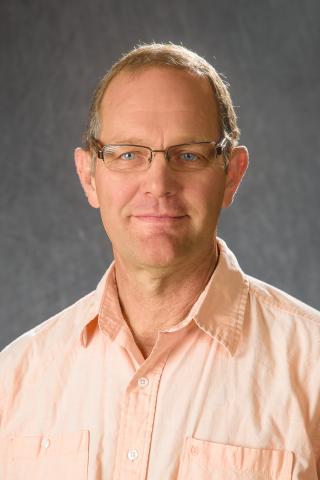Tim D. Phillips

Last Revised: Jan 16th, 2025
Professional Biography
Areas of Interest: Tall fescue genetics, wide hybridization in the Festuca-Lolium complex, and grass-endophyte interactions. One particular variety which Dr. Phillips released, Lacefield MaxQ II, contains a novel endophyte developed by AgResearch in New Zealand. While active, the endophyte does not produce the ergot alkaloids that can cause fescue toxicosis, a disease that primarily affects cattle but can also negatively impact pregnant mares and milk producing goats. The active alkaloids in the variety give it drought tolerance, insect resistance and help with vigor.
Books & Book Chapters
Phillips, T. D. 2008. Breeding Turfgrasses. pp. 203-207. IN: Handbook of Turfgrass Management and Physiology, M. Pessarakli, ed., Taylor and Francis Group, Boca Raton, FL.
Refereed Journal Articles
Jamboonsri, W., T. D. Phillips, R. L. Geneve, J. P. Cahill, and D. Hildebrand. 2012. Extending the range of an ancient crop, Salvia hispanica L.-a new ω3 source. Genetic Resources and Crop Evolution 59(2): 171-178. (Watchareewan Jamboonsri was a PhD student in Plant Physiology) Authors in PSS Dept.: Tim D. Phillips David Hildebrand
Johnson, J. M., G. E. Aiken, T. D. Phillips, M. Barrett, J. Klotz, and F. Schrick. 2012. Steer and pasture responses for a novel endophyte tall fescue developed for the upper transition zone. Journal of Animal Science 90(7): 2402-2409. Published online: doi: 10.2527/jas2011-4493. (Jennifer Johnson was a PhD student in Crop Science) Authors in PSS Dept.: Tim D. Phillips Glen Aiken Michael Barrett
Handayani, I.P., M.S. Coyne, and T. Phillips. 2011. Soil organic carbon fractions differ in two contrasting tall fescue systems. Plant and Soil 338:43-50. Authors in PSS Dept.: Tim D. Phillips Mark Coyne
Jamboonsri, W., T.D. Phillips, R.L. Geneve, J.P. Cahill, and D. Hildebrand. 2011. Extending the range of an ancient crop; a new ω3 source. Genetic Resources and Crop Evolution. Published online: doi: 101007/s10722-011-9673-x. Authors in PSS Dept.: Tim D. Phillips David Hildebrand
Handayani, I.P., M.S. Coyne, and T.D. Phillips. 2010. Soil organic carbon fractions differ in two contrasting tall fescue systems. Journal of Plant and Soil Science. Published online: doi: 10.1007/s11104-0100352-z. Authors in PSS Dept.: Tim D. Phillips Mark Coyne
Siegrist, J.A., R.L. McCulley, L.P. Bush, and T.D. Phillips. 2010. Alkaloids may not be responsible for endophyte-associated reductions in tall fescue decomposition rates. Functional Ecology 24(2):460-468. Published online: doi: 10:1111/j.1365-2435.2009.01649.x. Authors in PSS Dept.: Tim D. Phillips Lowell Bush Rebecca McCulley
Clement, S.L., V.L. Bradley, L.R. Elberson, D.E. Bragg, and T.D. Phillips. 2009. Cereal leaf beetle colonizes grass germplasm nurseries and impacts seed production activities. Forage and Grazinglands. Published online: doi:10.1094/FG-2009-1214-01-RS.
Phillips, T.D., and G.E. Aiken. 2009. Novel endophyte-infected tall fescues. Forage and Grazinglands. Published online: doi:10.1094/FG-2009-1102-01-RV. Authors in PSS Dept.: Tim D. Phillips Glen Aiken
Siegrist, J.A., R.L. McCulley, L.P. Bush, and T.D. Phillips. 2009. Alkaloids may not be responsible for endophyte-associated reductions in tall fescue decomposition rates. Functional Ecology. Published online: doi:10.1111/j.1365-2435.2009.01649.x. Authors in PSS Dept.: Tim D. Phillips Lowell BushRebecca McCulley
Stefaniak, T.R., T.D. Phillips, C.A. Rodgers, R. VanDyke, and D. Williams. 2009. The inheritance of cold tolerance and turf traits in a seeded bermudagrass population. Crop Science 49:1489-1495. Authors in PSS Dept.: Tim D. Phillips David Williams
Tim D.Phillips, 2008. Breeding turfgrasses. pp. 203-207. IN: M. Pessarakli, ed. Handbook of Turfgrass Management and Physiology. Taylor and Francis Group, Boca Raton, Fla.
Owens, H.T., C.H. Finneseth, T.M. Tillery, and T.D. Phillips. 2007. Germination rate and seedling vigour of tall fescue as affected by endophyte status and seed density. pp. 271-274. IN: A.J. Popay and E.R. Thom, ed. 6th International Symposium on Fungal Endophytes of Grasses. Grassland Research and Practice Series 13. New Zealand Grassland Association, Christchurch, New Zealand, March 25-28.
Education
Course Instruction
Term(s) Taught:
Term(s) Taught:
Term(s) Taught:
Term(s) Taught:
